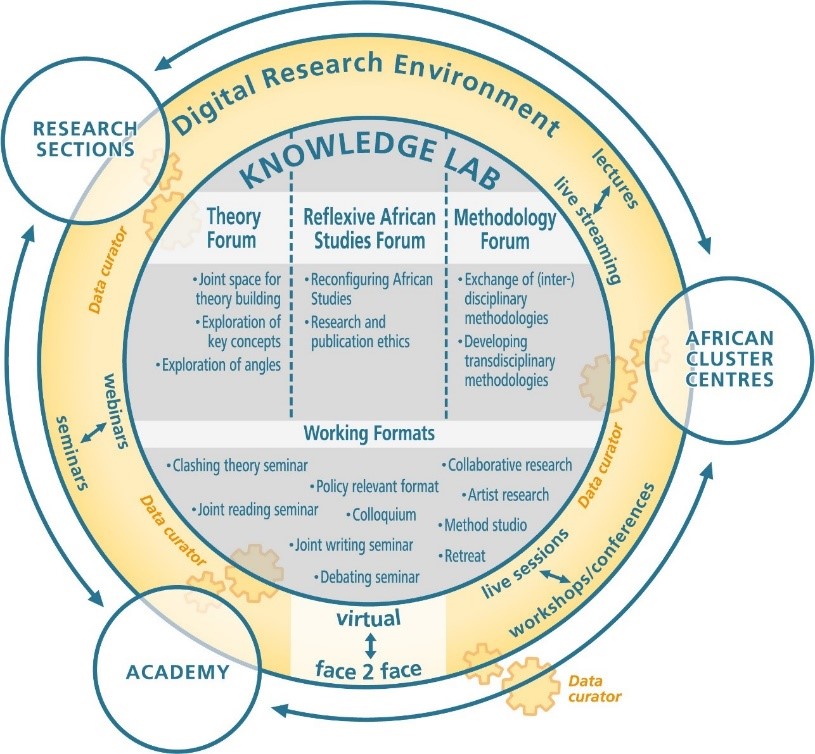General Information
The Theory Forum is where the joint theory-building takes place and where the cluster’s researchers bring their work to theoretical fruition. Assembling all members of the cluster and their various projects, the Theory Forum hosts the cluster’s more abstract, yet empirically grounded theoretical debates. Dedicated to exploring the cluster’s key theoretical concepts of multiplicity and relationality, debates in the Theory Forum allow researchers to relate their projects to the joint research agenda and to operationalise these concepts for their own projects in turn. Regular discussion of the four heuristic angles animates debates across the different disciplines and projects. Grounded in the cluster’s ongoing research, the Theory Forum also works towards the identification of common theoretical concerns.
The Reflexive African Studies Forum has the (self-)critical reconfiguration of African studies as its focus. In this forum, cluster members engage in critical and systematic reflection on the terms and premises of academic knowledge production. In particular, this forum seeks to reconsider the “African” in African studies on various levels:
- by including and collaborating with African colleagues in debates and research;
- by questioning the ways in which our positionalities as researchers are grounded in our respective localities and disciplines;
- by rethinking “Africa” as a descriptive and analytic concept and as an “area”;
- and by generally putting “Africa” into question.
In this context the role of the Digital Research Environment (DRE) in influencing and shaping epistemes, research practices within disciplines, and transdisciplinary collaborations will be analysed. Furthermore, the Reflexive African Studies Forum serves to devise and develop the cluster’s research and publication ethics.
The Methodology Forum provides a laboratory for the honing of methodologies across disciplines. Comparing methodological approaches allows us to identify the limits and possibilities of our respective methods, to improve our collaborations, and to create synergies. In this forum, we debate methodological exchanges and the emergent issues that arise in our transdisciplinary collaborations and research structures. The ultimate aim of this forum is to cultivate and reflect on methodological approaches to transdisciplinary research that will inform our reconfiguration of African studies.
Working Formats
The Knowledge Lab provides the cluster with a portfolio of formats that has been developed and expanded in the course of ongoing research and debate. Project members and their research partners use classical academic lectures and seminars but also interactive formats. Performances and other artistic production form part of the portfolio, along with joint writing and reading sessions, method studios, policy relevant formats, and clashing theory seminars.
In addition to the numerous activities organised and carried out within the cluster’s Research Sections, such as guest lectures, workshops, and seminars, the Knowledge Lab offers two core meeting formats: the cluster’s plenary colloquium, which meets weekly during term-time, and a two-day retreat at the end of the summer term. Thematically, the colloquium alternates between the three fora (Theory, Reflexive African Studies, and Methodology), and offers lectures, seminars and readings focussed on the annual theme. The two-day retreat concluding the academic year offers principle investigators and guests a forum to exchange on ongoing research and to reflect upon structural needs.
Accelerated in its development by the Covid pandemic, the Digital Research Environment (DRE) allows for virtual participation in ongoing sessions as well as access to archived lecture and seminars. Lectures are accessible online, selected seminars are recorded and archived, while conference and workshop sessions may be live-streamed. The DRE thus enables all cluster members’ and guests’ continuous access to its activities and working formats, regardless of their respective locations.


